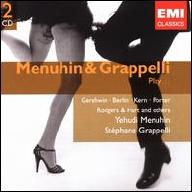Menuhin displayed a talent for music at a very young age. Starting to play the violin at the age of four, he made his professional debut with the San Francisco Symphony Orchestra three years later. His performance of Beethoven's Violin Concerto at Carnegie Hall, in 1927, sparked international acclaim. Menuhin's debut album, recorded at the age of 16, received the prestigious Prix du Disque in France.
The oldest child of Russian-Jewish immigrants Moshe and Marutha Menuhin, Menuhin was still a baby when he moved with his family to San Francisco. A student of Louis Persinger, concertmaster of the San Francisco Symphony Orchestra, Menuhin advanced quickly on the violin. When Persinger moved to New York in 1925, Menuhin and his family followed.
Shortly afterwards, a wealthy attorney funded Menuhin's first trip to Europe. Although he failed to impress Belgian violinist and composer Eugene Ysaye, Menuhin was accepted as a student by Romanian violinist and composer Georges Enesco. He continued to study under Enesco until returning to the United States in 1927. Menuhin continued to attract attention throughout his teens. He recorded Elgar's Violin Concerto with the composer conducting and inspired Béla Bartók to compose his second Violin Concerto for him.
Despite his fame, Menuhin left the concert stage at the age of 19 and spent two years studying violin technique at his family's estate in Los Gatos, CA.
Upon his return, Menuhin picked up where he had left off. During World War II, he performed hundreds of concerts at military bases and hospitals. With the breakup of his marriage to Nola Nicholas, however, he found that he was losing his ability to play the violin. A relationship and eventual marriage with ballet dancer and actress Diana Gould provided the confidence necessary for regaining his skills.
In the aftermath of the war's end, Menuhin performed several historic concerts in Europe. In addition to joining with composer and conductor Benjamin Britten for a trip to Poland in 1947, which included a performance for survivors of the Bergen-Belsen concentration camp, he became the first Jewish musician to perform in Germany since before the war. He collaborated with the Berlin Philharmonic conducted by Wilhelm Furtwangler. For the next four decades, Menuhin remained one of classical music's most influential musicians. Moving to England in 1985, he became a member of the House of Lords in 1993. He later relocated to Switzerland. He continued to be revered, however, in the United States. President Reagan bestowed a Kennedy Center honor upon him in 1986. Throughout his life, Menuhin balanced his musical career with involvement in philanthropic causes, founding an estimated five hundred charitable organizations. In 1962, he opened a boarding school in Stoke D'Abergnon for musically gifted children. He later opened a similar school in Gstaad, Switzerland. ~ Craig Harris, Rovi


















